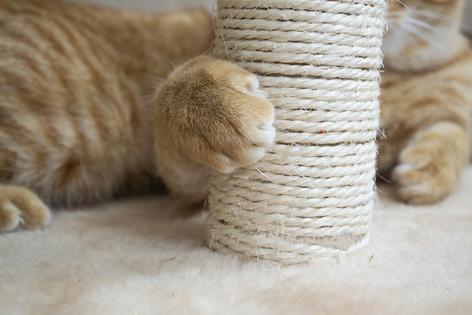My Pet World: Why opposition to declawing is about cat welfare, not zealotry
Dear Cathy,
I have two cats and have had multiple cats over the last 40 years. All of the cats were adopted at a young age from the local shelter, and a few were taken in from other sources. I had a grand total of nine cats and they were never allowed out of the house and I declawed all of them. I don't want any of them playing together and, at times, they tussle with more aggressiveness than I prefer.
They don't need the claws to live a normal life as an indoor cat and it eliminates the damage they can do to our furnishings or to each other. People that are opposed to declawing are overzealous with the opinion that it is cruel and unusual treatment. If this practice is outlawed in all states, I believe cat ownership will decline. The declawing is for the benefit of the cat the same way neutering and spaying is.
— John K.
Dear John,
You didn’t mention your city and state, so I am not sure where you are writing from, but in many parts of the U.S. declawing is increasingly considered an unnatural and harmful practice for cats. The opposition to declawing is not about being overzealous but rather about the increasing awareness about cat welfare. Many veterinarians, animal welfare organizations, and pet owners who advocate against declawing do so out of concern for the long-term physical and emotional health of cats. Here’s why.
Declawing involves amputating part of the cat’s toes, which can cause immediate and long-term pain and discomfort. In some cases, it leads to behavioral changes such as increased aggression, biting, or avoiding the litter box. Declawed cats can also develop mobility issues, as they rely on their claws for balance, climbing, and other natural movements. Over time, the altered posture can lead to arthritis and joint problems.
Emotionally, declawed cats may experience stress, anxiety, or frustration due to their inability to scratch and mark territory, behaviors that are innate to felines.
Additionally, declawing leaves cats without their primary defense mechanism, making them vulnerable even in an indoor environment. As a result, declawing is banned or significantly restricted in several places across the United States and worldwide due to concerns about the long-term effects on the cat's health and well-being.
In 2019, New York became the first U.S. state to officially ban declawing, followed by Maryland in 2022. Additionally, several U.S. cities, including Los Angeles, San Francisco, Denver, Pittsburgh, and Austin, have local bans in place. Internationally, the United Kingdom, Australia, New Zealand, Germany, France, Italy, Switzerland, Sweden, Austria, Israel, Norway, and Finland consider declawing a form of animal cruelty.
There is now a deeper understanding of how declawing can affect a cat’s behavior, mobility, and overall quality of life. This shift in understanding has led to the creation of humane alternatives, such as regular nail trimming, providing scratching posts, using claw caps, or training cats to scratch in designated areas. These options offer humane ways to manage a cat’s natural behaviors without subjecting them to a painful and potentially harmful procedure.
My goal, and that of others who share similar views, is to promote humane alternatives that allow cats to keep their natural behaviors intact while still protecting homes and furnishings. While I respect your right to make decisions for your own pets, it's important to recognize that our understanding of animal welfare has evolved, and we know more about the impact this procedure has on our feline felines. I hope going forward, you will reconsider your position and the humane alternatives available.
And thank you for spaying and neutering your cats.
Dear Cathy,
Is there anything I can add to my 18-month-old Havanese's diet to relieve itchy paws. I see ads for supplements, but they are very confusing.
— Debra
Dear Debra,
It’s important to address the root cause of the itching. Allergies (both environmental and food-related) are common in dogs and can cause itchy paws. Before adding supplements, it’s a good idea to speak with your veterinarian to rule out underlying allergies or other skin conditions.
That said, certain dietary changes and supplements may help. Omega-3 fatty acids, commonly found in fish oil supplements, can help reduce inflammation and promote skin health. Look for high-quality supplements with EPA and DHA.
Additionally, some dogs benefit from probiotics, which support gut health and may reduce allergic responses. You might also consider switching to a hypoallergenic or limited-ingredient dog food to see if food sensitivities are contributing to the issue. But always consult your veterinarian before making changes to your dog’s diet.
Hope this helps.
_____
_____
========
(Cathy M. Rosenthal is a longtime animal advocate, author, columnist and pet expert who has more than 25 years in the animal welfare field. Send your pet questions, stories and tips to cathy@petpundit.com. Please include your name, city, and state. You can follow her @cathymrosenthal.)
©2024 Tribune Content Agency, LLC.
(c) 2024 DISTRIBUTED BY TRIBUNE MEDIA SERVICES, INC.












Comments